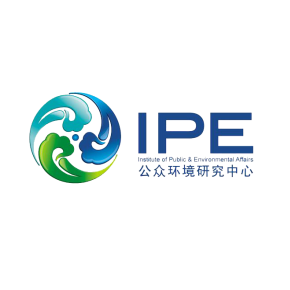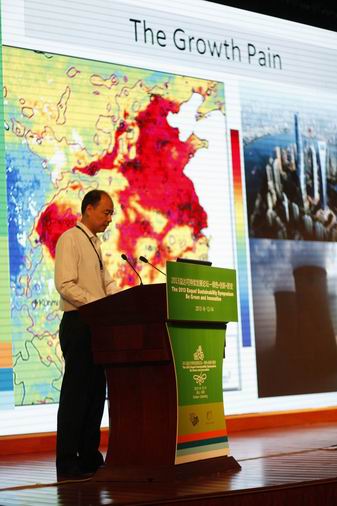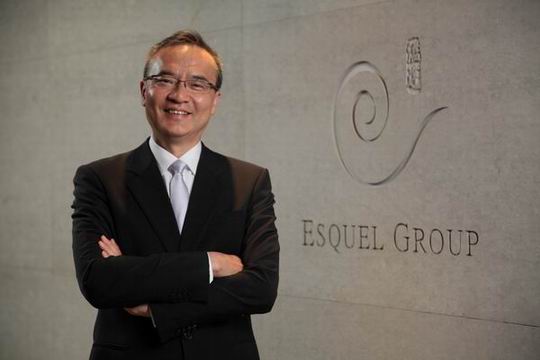news
The Institute of Public and Environmental Affairs (IPE)
07 / 12 / 2013
The Institute of Public and Environmental Affairs (IPE) has just released its Green Choice Alliance Phase III Textile Industry Investigative Report. In it, Esquel Group was commended for its deliberate efforts in identifying violation risks in its supply chain and pushing suppliers to take corrective actions and disclose information.

The report, for the first time, published a Corporate Information Transparency Index (CITI), assessing and ranking 48 Chinese and international brands on their green performance. Esquel Group is ranked No.1.
Click here to read the full report (CN)http://bit.ly/1dTCs9L
Click here to read the press release (EN)http://bit.ly/18comh7
To learn more about IPE and its work, please visithttp://www.ipe.org.cn/en
______________________________________________________________________________________________________________________________________
Textile Exchange / Featured Member, Esquel Group Dec 2013
03 / 12 / 2013
Esquel Group is the featured member of Textile Exchange this month! Our continuous efforts in sustainability are highlighted in the article below especially our recent sustainability symposium.
Click the link below to read the full article.
http://textileexchange.org/featured-member/te-featured-member-esquel-group-december-2013
_________________________________________________________________________________________________________________________________
Interview: John Cheh, Vice Chairman & CEO of Esquel Group
02 / 12 / 2013
While the increasing labor and production cost in China is frequently cited, Esquel does not plan on “running away from rising costs", as John stated in a recent article by Just-style (a leading online source of textile and apparel industry intelligence), but tries to “contain them and digest them through efficiency and productivity and through other improvements instead.”
+ + + + + + + + + + + + + + + + + + + +
By Michael Standaert - 27 November 2013
While many companies may be looking for strategies to exit China as its labour and manufacturing costs rise, that is certainly not the case for Hong Kong-based quality cotton shirt manufacturer Esquel Group. John Cheh, the company's vice chairman and CEO, tells just-style how the group continues to grow, sustain and innovate.
Challenges provide opportunities for Esquel, to not only expand, but innovate and build a long- term position serving the growing China consumer market, Cheh told just-style in an interview at his office.
Esquel, established in 1978, has ridden the huge wave of economic growth in China through its operations in the southern Chinese province of Guangdong, building a conglomerate that straddles the supply chain from cotton to retail.
Customers for its quality men's cotton shirts are top brands worldwide, including Ralph Lauren, Abercrombie & Fitch, Tommy Hilfiger, Nike, Hugo Boss, to name a few. Meanwhile, it has been growing sales to domestic brands in China, including developing its own - Pye and Shirt Shop.
"Ten years ago the China market hardly showed up on our radar," Cheh said. "Now it is around 15% of our business, which is a huge amount of business in a very short time."
Clearly, having most of its operations in China helps tap that growing market, and even though operational costs from labour and environmental regulations are rising, Cheh said that has only pushed the company to adapt.
"We don't run away from rising costs," Cheh said. "We try to contain them and digest them through efficiency and productivity and through other improvements."
Cheh said that past and present investments in training employees in its Guangdong operations have helped to build a more productive workforce that can operate complex machinery and make complicated garments.
Esquel's fabric mills are still located in Guangdong, and woven shirt capacity has increased from 4m yards a month 10 years ago to around 12m yards-a-month today, Cheh said. Knit fabric production has also expanded, to almost triple the amount it was ten years ago.
"We are not migrating out of Guangdong," Cheh said. "We are not relocating, whether to the interior, or to abroad. We are digging in. We have been adding to facilities, increasing investments, adding capacity, in Guangdong, as well as elsewhere. It's not one at the expense of another."
Manufacturing network
Logistically, China still makes much more sense for Esquel than moving large portions of its operations elsewhere - although it has been spreading its manufacturing network.
Satellite operations have been set up in Ningbo and Changzhou near Shanghai, and a factory was recently taken over in Guilin, in the Guangxi autonomous region - today reached in about five hours from the company's main facilities in Gaoming, Guangdong, but in a few years just 1½ hours away by high-speed rail.
Esquel also has production facilities in Mauritius (woven), Sri Lanka (knit), Malaysia (woven) and Vietnam (knit).
According to Cheh the company has seen tremendous growth in its Vietnam operations in recent years, having built a new factory around 45 minutes from Ho Chi Minh City and bought another factory there, which he said were "two amazingly efficient factories." The company also invested in a new shirt factory 40 minutes from Hanoi two years ago.
"Our experiences there have been very good," Cheh said, adding that while China currently has about 37% of the US market for apparel, Vietnam is in second place with around 10%.
"I think we have been right about picking Vietnam," Cheh said, adding that its proximity to the company's China operations is a huge advantage. In a few years Esquel expects to be able to deliver fabric in one day, down from the current four by boat, once more infrastructure is in place and border customs procedures become faster.
Cotton production
Esquel's ginning facilities for cotton are located in northwestern China's Xinjiang autonomous region, which is the country's major cotton producing area.
The company produces extra-long staple (ELS) cotton mostly grown in Xinjiang, combining it with high-quality, high-count yarns using Pima-grade cotton from the US, and Giza-grade cotton from Egypt. It also has organic cotton farms in Xinjiang as well, but this is mainly for testing, research and development, Cheh said.
"Quality control starts with the cotton, then the yarn, which comes to Guangdong for weaving, finishing and dyeing," Cheh said.
Global cotton price fluctuations, and a Chinese government policy implemented in 2011 to set a price on upland cotton that the state-owned China National Cotton Reserves Corp purchases from farmers in Xinjiang, have had major impacts on the company's sourcing of premium cotton in the past two years, Cheh said.
This policy encouraged China's cotton farmers to boost production of upland cotton, which is bulk commodity cotton that Esquel Group purchases very little of, Cheh said. But ELS cotton production, which was not included in the policy, dropped.
Historically, Esquel sourced around 80% to 90% of its ELS cotton from Xinjiang, but production has dropped by about two-thirds in the last three years, forcing the company to source premium cotton from elsewhere. Around 50% of its cotton is now sourced from the US.
"We are now using more and more Pima cotton, shipped from California, to Xinjiang, then down to Guangdong," Cheh said. This has added to logistical costs, but prices of Chinese ELS have also gone up by around 40% because of the reduction in production, he said.
The influence of trade pacts
Esquel is also following trade policy closely around the world as it "has a very determining factor in our strategy," Cheh said.
In Mauritius, for example, operations are directed at exploiting the US African Growth Opportunity Act (AGOA) which allows duty-free access into the US market for some of the company's customers, a policy that essentially keeps these operations sustainable.
Ongoing negotiations regarding the planned Trans-Pacific Partnership (TPP) trade agreement to include the US and others, also have relevance for the company, particularly in regard to Malaysia and Vietnam's membership.
"If it goes through it will be of material interest and advantage to us," Cheh said. "Chinese companies are investing in Vietnam because of TPP. Spinning mills are going there because of the cotton policy [in the agreement], and also because of the rule called yarn-forward, which means you are supposed to make the yarn in a TPP country in order to qualify."
Cheh said the process would determine whether the company will set up a fabric mill in Vietnam because currently all its knit fabric is milled in China.
In the past few years, besides the Vietnam expansion, the company has also expanded its woven fabric mill in Gaoming and is reviewing further expansion there. In Guilin, Esquel purchased an old factory and rebuilt the workshop and has hired 2,000 workers.
Overall, business has been growing at around 8% to 10% a year in both revenue and volume, Cheh said, and it is expected that Esquel is on track to reach about US$1.35bn in revenue for this year.
http://www.just-style.com/interview/john-cheh-vice-chairman-and-ceo-of-esquel-group_id119694.aspx



